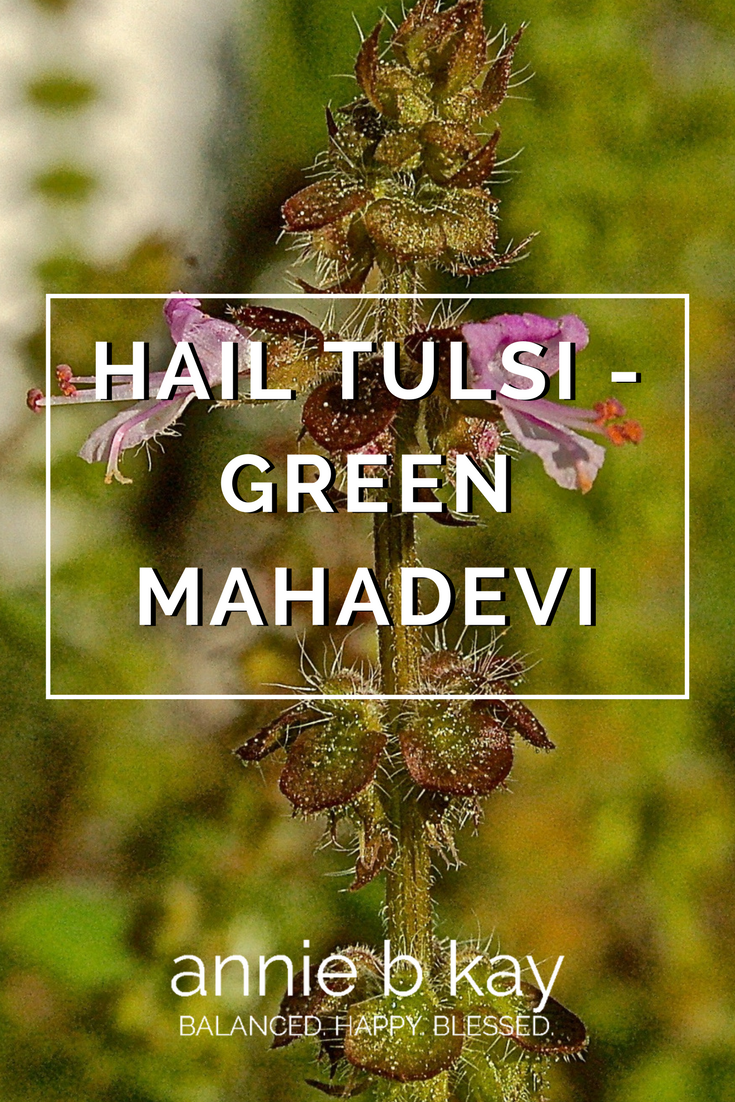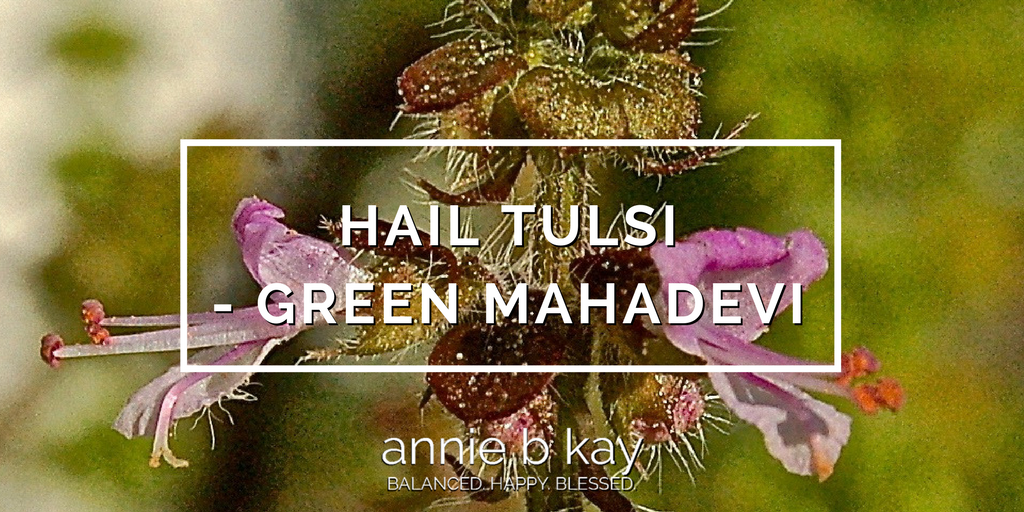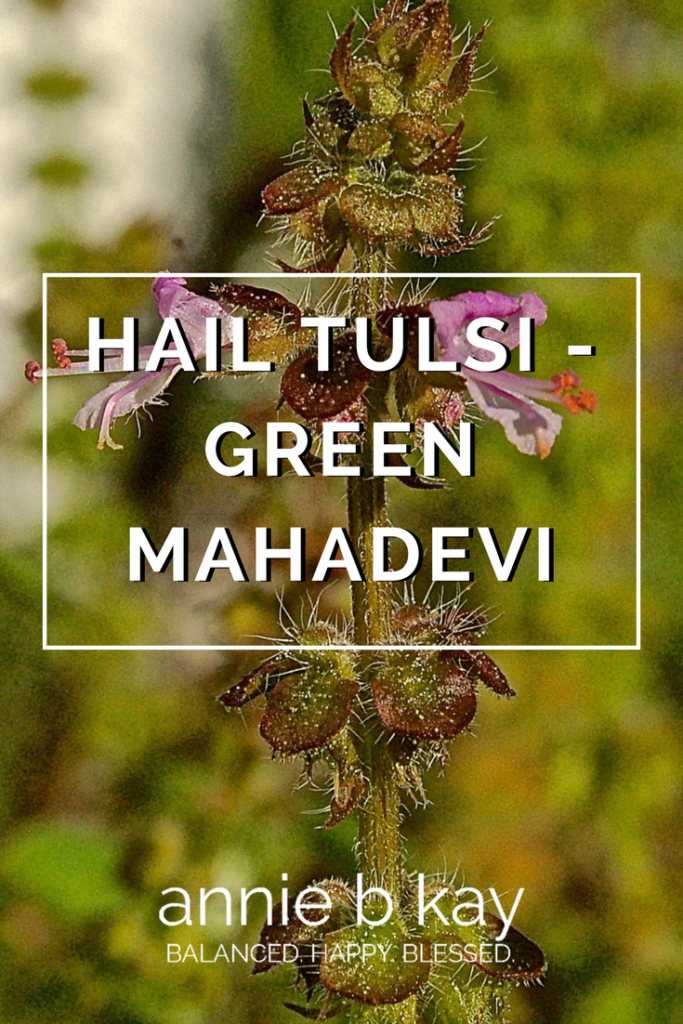
Hail Tulsi – Green Mahadevi

My garden right now is filled with the sweet green goddess known as tulsi.
Tulsi is a type of basil that originated in India. There are several types, like sisters in a family. If you ‘do yoga’, love botanicals, AND you haven’t met tulsi yet, I’m happy for you. Your future includes meeting one of the most sweetly powerful and healing herbs in the canon. I have great sisterhood with this plant and feel that I am introducing you to one of my coolest and best friends. When I refer to her, I am referring to the big T – the green goddess herself – tulsi.
A distinguishing feature of tulsi is its fragrance – it’s rich, buttery and flowery with an undertone of funk. Tulsi (which translates as “incomparable one” in Sanskrit) occupies an auspicious place in yogic/Ayurvedic tradition. It is thought to be an embodiment of the goddess Lakshmi, she of abundant good fortune, of being held in esteem in a community, and of generosity. In India, many homes have a tulsi plant at their doorstep, and women (and I’m sure men) have a tulsi plant near their bed so that the gentle breeze carries the scent of tulsi to them as they sleep, bestowing them with ageless beauty.
In the Garden
Much like the goddess, my tulsi seems to have a mind of her own. She goes where she wants, comes up really late (late June this year – thank goodness I held her space!). I have not been successful at growing her from seed so that I can get a jump on the season – nope, not how she’d prefer to roll. Yet, tulsi comes rolling back, year after year in her own preferred manner my garden. I often smell tulsi and then oh, there’s a plant popping up amongst the roses or corn.
I never needed tulsi seeds, though I’ve purchased many packets. My original tulsi plant came to me auspiciously – from Sweetwater Sanctuary in VT. Pam Montgomery gave me and my fellow apprentices plants (in 2013), and mine has happily multiplied into tulsiville.
Culinary & Preserving
I’ve tried for years to make a good oil infusion of tulsi but have been only modestly successful at capturing that unique fragrance in oil. Drying, I find, works best for me. I’ll then drink it as tea through the cooler months. If I have a gathering of gal herbalists I may attempt herbalist Brittany Wood Nickerson’s yellow cake which she served once incorporating dried tulsi….magnificent. She’s just come out with a cookbook filled with scrumptious herbal fare, but the way, which I strongly recommend.
You can also make a pesto with tulsi.
To dry tulsi or any herb (I have mugwort, cilantro, lemon balm and mint drying now), gather a bunch of it, tie it into a bundle at the stem, and hang in a place that will be warm and dry. Attics are great if they are reasonably well ventilated, and you can find a place to hang your crop. After a couple dry weeks (challenging this year), cut the bundle down. For plants that I intend to use as a tea of spices, I pull the dry leaves off the stem and place them in glass jars. Between Mason and jelly jars, you have a jar for any quantity of herb.
Medicinal & Energetic
From a Western medical perspective, tulsi is an adaptogen and has been studied for a variety of uses. Adaptogenic activity means that, like ginseng, it contains a complex array of phytonutrients that act in different ways but tend to overall support homeostasis – or healthful balance. So, tulsi tea is a terrific drink through the fall when back-to-whatever stress and cool winds conspire to give us colds and other crud.
Energetically, I’ve done a number of shamanic journeys with tulsi and here’s what I learned. Tulsi embodies all the goddesses of tantra – she’s Lakshmi, Deva, and yes Kali and all the rest – all rolled into one. She just might be the MahaDevi – the mother goddess. This is my own perspective colored, no doubt by my study of the goddesses of tantra. I know and love them, and draw on them often. In my study, these goddesses represent parts of ourselves (even if you are a man – we each contain both divine masculine and feminine within us). So, interestingly, I’ve found tulsi is energetically adaptogenic as well. From my discussions with other herbalists in my tradition who work energetically with plants, my view is not unique.
You can increasingly find tulsi plants and seed at your local garden shop. If not, try Mountain Rose Herbal or Horizon Herbs.
Have a beautiful day.



